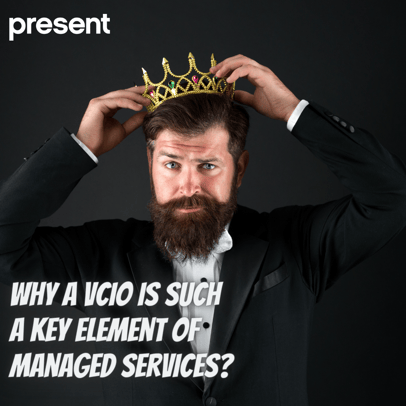Present Blog – IT Thought Leadership
Blog Present-IT thought leadership
Blog Present-IT thought leadership
IT thought leadership blog for CIOs and CTOs in Canada seeking resources to drive IT as a business contributor: hybrid cloud, infrastructure, managed services and security and IT recruitment.
Why a Virtual Chief Information Officer (vCIO) is such a key element of Managed Services
present More and more companies are opting to outsource their IT operations to take advantage of the many benefits of IT managed services: focus on your core business, accelerate your key IT projects, control or reduce your IT costs, improve the security of your business and availability of your systems, provide better support for your users and have access to vast expertise.
More and more companies are opting to outsource their IT operations to take advantage of the many benefits of IT managed services: focus on your core business, accelerate your key IT projects, control or reduce your IT costs, improve the security of your business and availability of your systems, provide better support for your users and have access to vast expertise.
In this blog post, we will delve into another key aspect as to why Managed services is gaining in popularity, having access to a vCIO, a strategic ally in navigating the complex landscape of IT management and planning for your company's growth in line with your goals and strategic needs.
What role does a virtual Chief Information Officer (vCIO) play?
A vCIO is an IT expert focused on ensuring the efficient management of your IT services while proactively implementing strategies and concrete activities that align with your strategic business objectives. As an advisor and visionary, a vCIO ensures that your IT strategy remains agile, responsive, and aligned with your overarching goals, as well as aims to maximize the impact the services will have on your business.
Let's explore six focus areas and understand the invaluable contributions a vCIO can make to a managed services client.
Strategic Planning: Your Virtual Chief Information Officer (vCIO) is tasked with creating an IT strategy plan tailored to your specific business objectives. By taking the time to understanding your business, they develop a technology roadmap including system upgrades, new technologies and cybersecurity initiatives, designed not only to support but also to propel your business forward.
Budgeting and Cost Optimization: Navigating the costs of technology can be daunting. A vCIO will guide your business in IT budget planning and cost optimization, as well as help you track the return on investment for existing and prospective technologies.
Cybersecurity Management: In an era where digital threats abound, safeguarding your data is paramount. Your vCIO will help plan and implement a robust cybersecurity strategy that maximizes your existing technology investment and minimizes cyber risk to your business.
Vendor Relationship Management: Managing multiple technology vendors can be a logistical challenge. Your vCIO help manage this responsibility by overseeing vendor relationships and negotiations to secure optimal services and pricing.
Performance Tracking and Analysis: Continuous monitoring of your IT ecosystem ensures optimal performance. Through regular performance assessments and insightful reporting, your vCIO leads the charge in providing actionable insights for enhancing technology effectiveness and efficiency.
Advisory and Consultation: Your vCIO serves as your trusted advisor in all IT matters. Stay abreast of emerging technology trends and capitalize on opportunities for business growth with expert guidance tailored to your unique organizational needs.
Conclusion
Having access to a vCIO as part of your managed services contract is a valuable asset for your business. These seasoned professionals bring a wealth of expertise to the table and will help guide your business through the complexities of IT strategy and implementation.
About Blog
The right use of technology addresses business challenges and drives business growth in all areas of an enterprise. We hope this blog will offer insight into developing strategies and tactics to enable you to identify those key drivers of growth and keep pace with and anticipate the rapid technology change of today.
Posts by Topic
- IT infrastructure (116)
- IT security (93)
- IT Innovation (59)
- Trends (51)
- Cloud (47)
- Managed services (47)
- Mobility (38)
- Digital transformation (29)
- CIO/IT leaders (28)
- Events (28)
- News (23)
- Microsoft 365 (17)
- Security (17)
- IBM (16)
- Disaster recovery (DR) (14)
- High availability (12)
- Recruitment (12)
- Storage (12)
- Big Data (11)
- Collaboration (11)
- AI (10)
- Case study (9)
- Office 365 (9)
- BYOD (8)
- Customer Experience (8)
- Hybrid Cloud (7)
- Current events (6)
- SAP Hana (5)
- Business intelligence (BI) (4)
- Converged infrastructure (4)
- Convergence / Hyper-convergence (4)
- Virtualization (4)
- Copilot (3)
- Future of retail (2)
- Retail (2)
- trend (2)
- Backups (1)
- Beacon (1)
- Blog Migrations (1)
- Contests (1)
- Infrastructure TI (1)
- Innovation TI (1)
- IoT (1)
- MDM (1)
- Stockage (1)
- Virtualisation (1)
- blockchain (1)
- cio (1)
- replication (1)
- Étude de cas (1)
